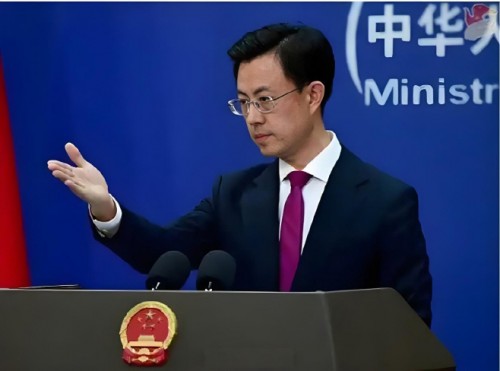 |
| Guo Jiakun, spokesperson for China’s Foreign Ministry, speaks at a regular press briefing in Beijing on August 27, reiterating that the development of China–Korea relations should not be influenced by third parties. / Source: Chinese Foreign Ministry |
China has responded to President Lee Jae-myung’s recent comments that Seoul can no longer pursue the traditional “security with the US, economy with China” strategy, stressing that the development of bilateral ties should not be subject to third-party influence.
Chinese Foreign Ministry spokesperson Guo Jiakun said at a regular press briefing on August 27, “A healthy, stable, and deepening China–Korea relationship is in the fundamental interests of both peoples, and contributes to peace, stability, development, and prosperity in the region and the world. This is the shared understanding of both sides.” He added, “The growth of China–Korea ties originates from mutual interests and neither targets a third country nor should be affected by one.”
Guo further emphasized policy consistency: “China’s policy toward Korea remains stable and continuous. We hope South Korea will work with us to ensure the strategic cooperative partnership continues to develop in a healthy and stable manner.”
While the official remarks struck a principled and moderate tone, Chinese state media took a sharper stance. An editorial in the Global Times, an affiliate of the Communist Party’s People’s Daily, criticized Lee’s statement, suggesting Seoul is ignoring the core challenge of maintaining “strategic autonomy” amid shifting global order.
The editorial warned that if South Korea were to follow Washington unconditionally on sensitive issues such as semiconductors, supply chains, Taiwan, and the South China Sea, it would “tie its national destiny to a dangerous vehicle.” It said distancing from China would bring “severe damage to Korea’s economy and people’s livelihoods” and undermine the country’s fundamental interests.
It further argued that a stable China–Korea relationship is “one of Korea’s most valuable strategic assets” and a foundation for resisting external pressure and preserving peace on the Korean Peninsula. Seoul, the editorial urged, must decide whether to be “a pawn on the chessboard or a player with independent judgment.”
Most Read
-
1
-
2
-
3
-
4
-
5
-
6
-
7





















